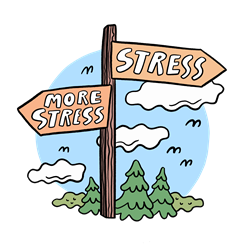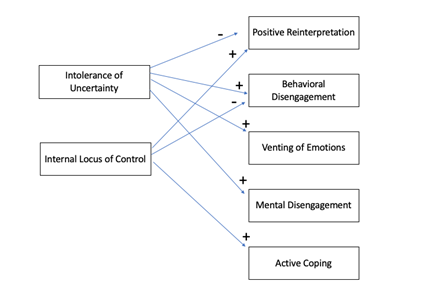Ethan Abbott, Sydney Caulder, & Morgan Hamilton (Advisor: Danielle Findley-Van Nostrand)

Background Info
Emerging adulthood is a highly exploratory and developmentally rich period of time in an individual’s life. Between the ages of 18 to 29 is a big transitional phase for young adults to develop their own identity and find their niche in society. There are frequent changes experienced through changing vocations, relationships, and living situations attributed to a significantly reduced sense of stability as compared to parts of life prior to and after emerging adulthood (Arnett 2000; Arnett et al., 2014). In order to properly evaluate how young adults are handling the transitional stressors of their lives coupled with the extenuating circumstances brought on by COVID-19 pandemic, we wanted to see if individual’s locus of control helped mitigate stress. Specifically, an internal locus of control refers to how much one believes their actions are the result of their own efforts, relative to the belief that outside events influence their future (external locus of control). If individuals perceive to have some form of control over a situation then they will find the aversive stimulus to be less threatening.
Another facet of stress management we wanted to measure is an individual’s intolerance of uncertainty. This term refers to the cognitive ability to compartmentalize unknown potentially negative events so that it won’t hinder mental health or physical actions. This anticipation of uncertainty derives from the desire for predictability and an active engagement in seeking certainty and paralysis of cognition and action in the face of uncertainty (Birrell, Meares, Wilkinson, & Freeston, 2011). Emerging adults will also employ various coping strategies for the sake of their physical and psychological well-being. Coping mechanisms are vital towards a young adult maintaining proper mental health because poor maintenance of mental thoughts and adjustment can lead to instability. The four types of core coping mechanisms that young adults utilize are problem-solving, support-seeking, escape, & accommodation (Skinner, Edge, Altman, & Sherwood, 2003). Given the current circumstances of the world at large, we thought it wise to conduct and evaluate a survey administered to the Roanoke College student body to see how these three facets of handling mental stressors are being employed amongst the young adult student population. For the sake of our study we used locus of control and intolerance of uncertainty as predictors of various coping mechanisms.
Methods
Participants in this study were recruited from current students at Roanoke College through the Psychology Department’s SONA system. Participants who were enrolled in psychology courses eligible for extra credit upon participation received one half credit. In total, 145 participants completed the study.
The survey was administered online through Qualtrics where participants were asked demographic information including gender, race, age, year in school, and impact of COVID-19. Previously constructed measurements were used for locus of control, intolerance of uncertainty, and coping. For locus of control, the 24-item Multidimensional Locus of Control Scale was used. Intolerance of uncertainty was measured using the 27-item Intolerance of Uncertainty Scale. Finally, coping was measured using the 60-item COPE inventory.
Results & Discussion
We decided to focus on intolerance of uncertainty and locus and control as predictors of coping in a multiple regression model. A multiple regression model demonstrates the strength of two individual predictors controlling for one another while also controlling for shared variance in a single outcome. The COPE inventory included different subscales focusing on specific forms of coping such as focus on venting of emotions or active coping. There were several significant associations found among the different subscales of coping when intolerance of uncertainty and locus of control were used as predictors. And, in each set of tests, there was a large effect size, meaning that these explained a fairly significant amount of the individual type of coping.
Having a higher internal locus of control was related to greater use of managing distress emotions rather than dealing with the stressor (positive reinterpretation) and less use of behavioral disengagement when controlling for intolerance of uncertainty which was related to less use of positive reinterpretation and more behavioral disengagement.
Internal locus of control was unrelated to, and intolerance of uncertainty positively related to both venting of emotions and mental disengagement.
There was one subscale, active coping, that was positively related to internal locus of control but unrelated to intolerance of uncertainty. See the figure below for an overview of regression results across models; the positive sign indicates as the level of the predictor increases the level of the outcome also increases, and the negative sign indicates that as the level of the predictor increases or decreases the outcome would do the opposite of that increase or decrease).
We also explored differences of mean scores between males and female participants. There were no significant differences based on gender in internal locus of control and intolerance of uncertainty scores, or coping subscales of use of instrumental social support, positive reinterpretation, active coping or behavioral disengagement. There were significant differences in scores based on gender for the coping subscales of focus on venting of emotions, use of emotional support, and mental disengagement.
Our data collection and analysis produced logical results that were mostly as expected. Our research can open the door to future research on how different forms of coping may indicate how individuals perceive changes within their life or the amount of control they feel they have over those changes. This research was especially meaningful given the current COVID-19 pandemic and associated mental health difficulties. Intolerance of uncertainty and internal locus of control may be influential in encouraging adaptive forms of coping.
Figure: Visual Representation of Regression Results: Intolerance of Uncertainty and Internal Locus of Control as Predictors of Forms of Coping.

Reflection
Creating a study which was interesting to all of us and able to be done efficiently through remote learning certainly posed a tough challenge to our group. Initially we thought a study more focused on the current challenges for emerging adults amidst the COVID-19 pandemic would be interesting, but we ultimately decided emerging adults face many challenges with uncertainty regardless of if they are enduring a pandemic or not. The beginning stages were relatively easy to manage by dividing up the work and checking in on each other periodically, but as we started using Jamovi our difficulties took a turn. One of the many challenges posed due to remote learning was the opportunity to learn an entirely new data analysis application, Jamovi. Although Jamovi is user friendly when conducting data, we struggled getting it to be compatible with Qualtrics, and those problems were difficult to work through together. Ultimately these issues were ironed out through many meetings with our group and Dr. Findley-Van Nostrand via Zoom trying to figure it out. Although ultimately our outcome of our research was largely unchanged, it was difficult to manage each challenge together while completing our tasks remotely, but I think we all understood the value of good communication and patience through completing this experience remotely.
References
Arnett, J.J. (2000). Emerging adulthood: a theory of development from the late teens through the twenties. American Psychologist, 55(5), 469–480.
Arnett, J.J. (2014). The new life stage of emerging adulthood at ages 18-29 years: implications for mental health. The Lancet Psychiatry, 1(7), 569–576.
Birrell, J., Meares, K., Wilkinson, A., & Freeston, M. (2011). Toward a definition of intolerance of uncertainty: A review of factor analytical studies of the Intolerance of Uncertainty Scale. Clinical Psychology Review, 31(7), 1198-1208. doi:10.1016/j.cpr.2011.07.009
Skinner, E.A., Edge, K., Altman, J., & Sherwood, H. (2003). Searching for the structure of coping: a review and critique of category systems for classifying ways of coping.. Psychological Bulletin, 129(2), 216-269.